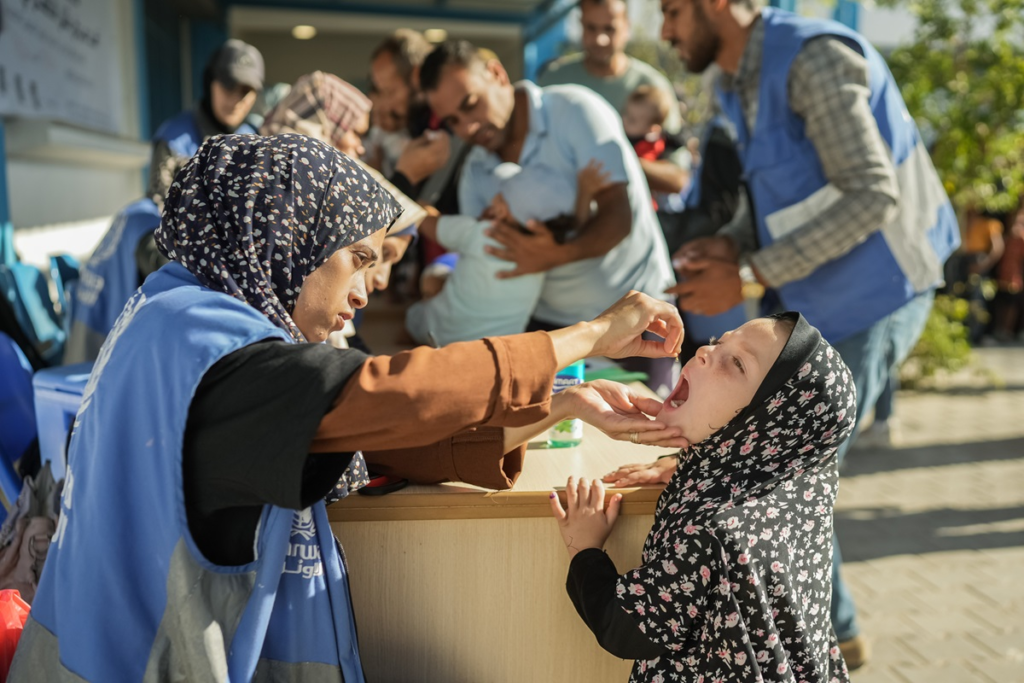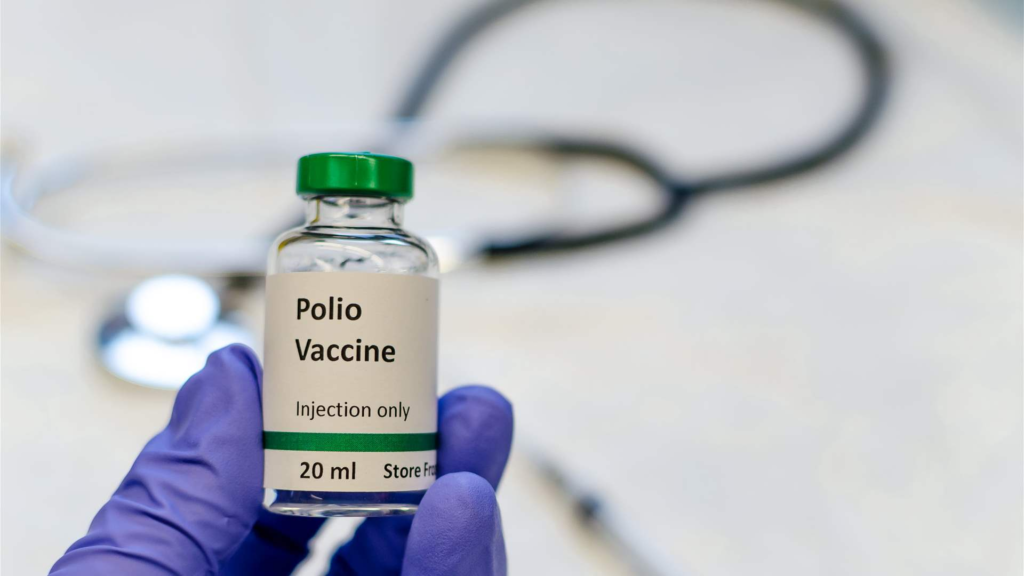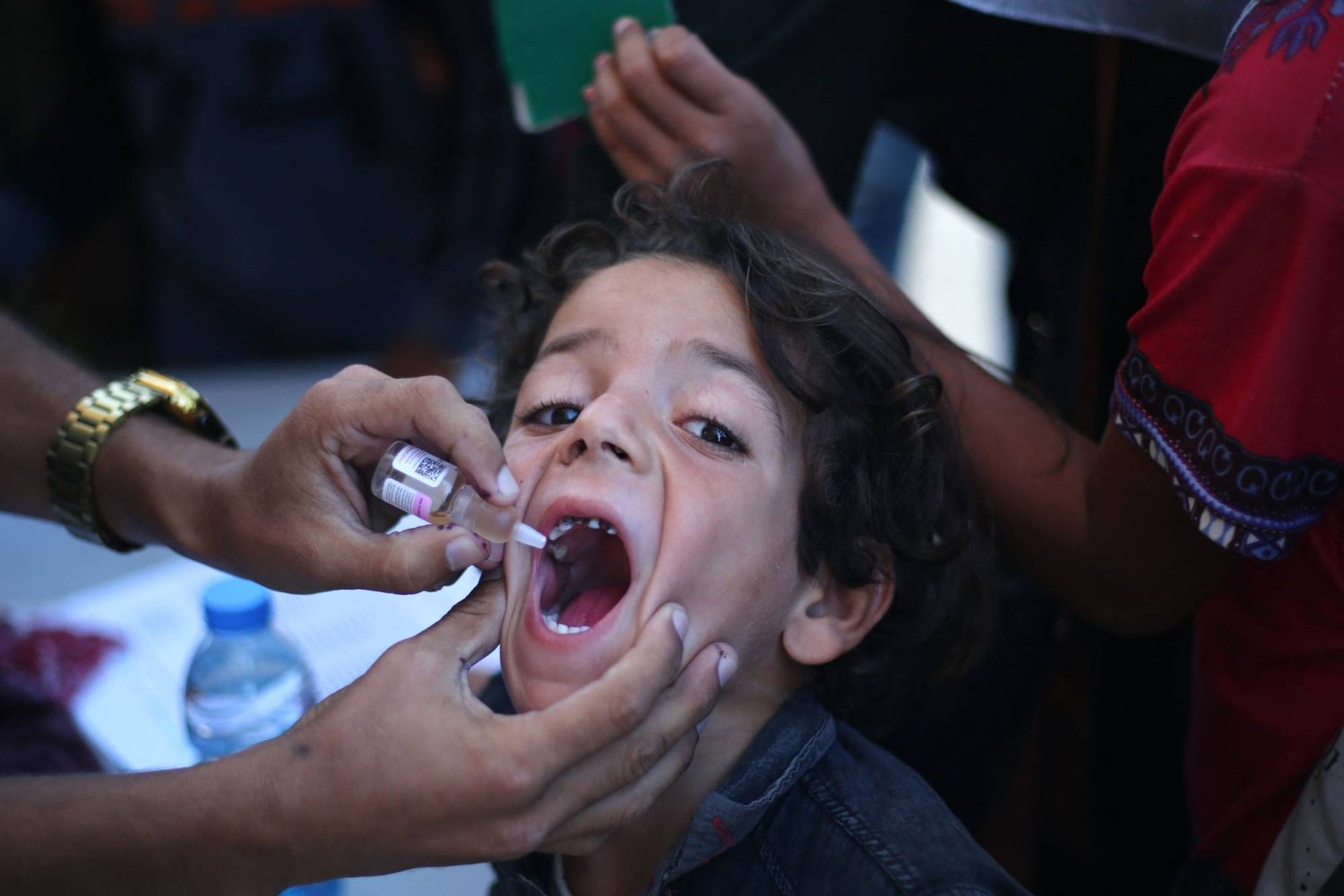The polio vaccination campaign in northern Gaza, aimed at safeguarding the health of over 119,000 children, has been postponed due to the ongoing Israeli bombardments and the subsequent humanitarian crisis.
The World Health Organization (WHO) confirmed that the current conflict, characterized by mass displacement and lack of access to health services, has made it impossible to carry out this critical public health initiative.
The postponement is a major setback in the fight against the spread of polio, a disease that can cause lifelong paralysis in children. The situation underscores the devastating impact of violence on essential health services in conflict zones.
The Urgent Need for Polio Vaccination
The polio vaccination campaign, which began on September 1, was launched in response to a confirmed case of polio in Gaza. In August, the WHO reported that a baby had been partially paralyzed by the type 2 poliovirus, marking the first case in the region in 25 years.
This discovery was alarming, as polio had been largely eradicated from many parts of the world, including the Palestinian territories, through widespread vaccination efforts. The resurgence of polio in Gaza highlighted the urgent need to vaccinate children in the area to prevent further cases and potential outbreaks.
Read : Israel Reportedly Trying to Create Hamas-Free ‘Bubble’ Zones in Gaza
Polio, a highly infectious viral disease, primarily affects children under five years of age and can cause permanent paralysis or death in severe cases.
While there is no cure for polio, vaccination is highly effective in preventing its spread. The polio virus spreads through contaminated food, water, and person-to-person contact, making it a significant public health threat in regions with poor sanitation and disrupted healthcare systems, such as Gaza.
Read : It Could Take 350 Years to Rebuild Gaza if It Remains Under Blockade: UN
Given the crowded living conditions and lack of clean water in Gaza, the risk of polio spreading is particularly high, making the vaccination campaign even more critical.
Impact of Conflict on Health Services in Gaza
The ongoing violence in Gaza has severely impacted the delivery of health services, including the polio vaccination campaign. The conflict between Israel and Hamas has led to widespread destruction of infrastructure, including hospitals and clinics, making it difficult for healthcare workers to provide essential services.
According to the WHO, the situation in northern Gaza is especially dire, with ongoing attacks on civilian infrastructure and the displacement of thousands of people. Many families have been forced to flee their homes, making it unsafe for them to bring their children to vaccination centers.
The WHO has repeatedly called for a ceasefire to allow the safe delivery of healthcare services, including vaccination campaigns. The organization has stressed that the current conditions make it impossible for health workers to operate and for families to access the necessary services.

In its statement, the WHO highlighted the risk of further spread of the poliovirus if the vaccination campaign is delayed. Without the second dose of the polio vaccine, children remain vulnerable to the virus, which could lead to more cases of paralysis in Gaza and potentially in neighboring countries.
The humanitarian crisis in Gaza has been exacerbated by the ongoing blockade, which has limited the flow of essential supplies, including medical equipment and vaccines.
The health system in Gaza was already under immense strain before the recent escalation of violence, with shortages of medicines and medical personnel. The conflict has only worsened the situation, leaving healthcare providers struggling to meet the needs of the population.
Calls for a Ceasefire and Humanitarian Access
The postponement of the polio vaccination campaign has drawn attention to the broader humanitarian crisis in Gaza. On Tuesday, the U.N. Palestinian refugee agency (UNRWA) called for a temporary truce to allow for the safe evacuation of civilians from northern Gaza, where many people are trapped in areas heavily targeted by Israeli airstrikes.
The agency described the situation as dire, with civilians “just waiting to die” amid the relentless bombardment.
The call for a ceasefire has been echoed by other international organizations, including the WHO, which has urged both sides to prioritize the protection of civilians and ensure access to humanitarian aid. The WHO has warned that the ongoing conflict is not only jeopardizing the lives of civilians but also undermining efforts to prevent the spread of preventable diseases, such as polio.
The organization has called on all parties to allow for the safe delivery of healthcare services, including vaccination campaigns, which are essential for protecting the health of children in the region.
The postponement of the polio campaign is just one example of how the conflict in Gaza is affecting the most vulnerable members of society.
Children, in particular, are bearing the brunt of the violence, as they are not only at risk of being caught in the crossfire but also of suffering from the long-term consequences of disrupted healthcare services. The international community has a responsibility to ensure that children in conflict zones, like Gaza, receive the protection and care they need.

The WHO’s call for a ceasefire and the safe resumption of the polio vaccination campaign highlights the importance of protecting public health even in times of conflict. While political and military considerations may dominate the headlines, the health and well-being of civilians, especially children, must remain a top priority.
Without immediate action to resume the vaccination campaign, there is a real risk that polio could spread further in Gaza and beyond, leading to more cases of paralysis and preventable suffering.
In conclusion, the postponement of the polio vaccination campaign in northern Gaza due to the ongoing violence is a tragic reminder of the devastating impact that conflict has on public health.
The delay in vaccinating over 119,000 children not only puts them at risk of contracting polio but also threatens to undo years of progress in eradicating the disease. The WHO’s call for a ceasefire and the resumption of healthcare services in Gaza is a crucial step in protecting the health of children and preventing further outbreaks of preventable diseases.
The international community must act swiftly to ensure that humanitarian access is granted and that the children of Gaza receive the life-saving vaccines they need.

